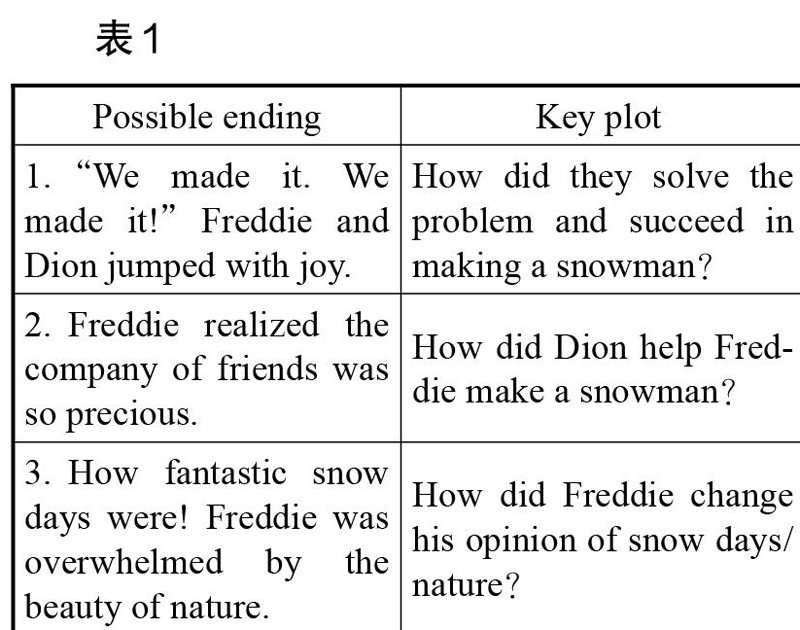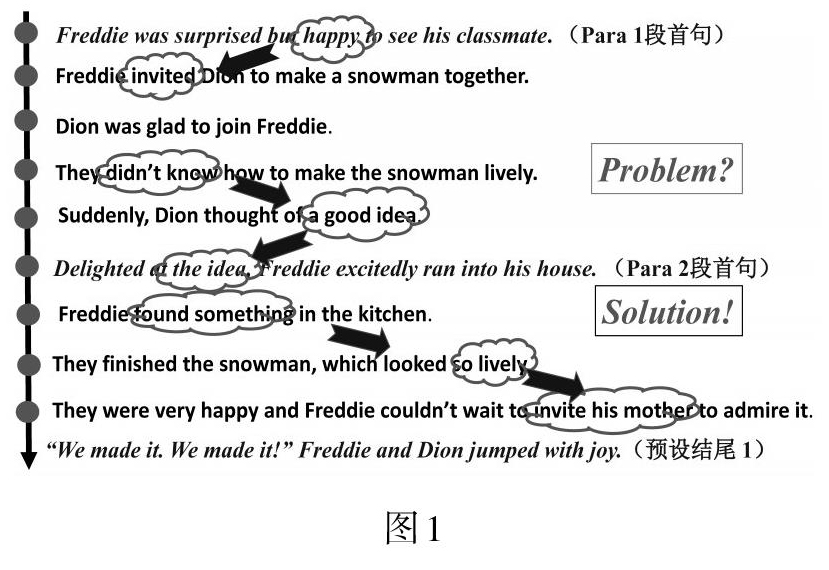周萍


摘? ? 要:在读后续写中学生难以在有限的时间内快速构思情节。为解决这一问题,学生可运用反向推导快速搭建情节。首先通过核心冲突和隐藏线索预设故事的结尾,然后以故事的预设结尾来推导中心情节,最后与段首句合围,推断出两段续写的具体情节,完成对故事情节的整体构架。
关键词:读后续写;反向推导;中心情节
读后续写是一种将阅读与写作紧密结合的考查形式,对学生语言能力的要求较高。笔者在调查中发现,接近半数的学生认为自己能读懂故事的大意,但由于缺乏对故事发展线索的分析能力和对故事发展细节的想象能力,难以在有限的时间内,编排出后续的故事情节。下面,笔者来谈谈如何通过反向推导构架故事的后续情节,从而实现对续写故事的快速构思。
一、运用反向推导构架情节的教学策略
反向推导即先设定故事的结尾,再根据预设的结尾反推情节。许多作家害怕预设故事结尾会束缚他们。其实,恰恰因为有了结尾,人物才能在结尾规定的范围内更有创造性[1]。
(一)由核心冲突和隐藏线索预设结尾
结尾是故事最具挑战性的部分。结尾必须解决冲突,从而让大家把悬着的心放回肚子里。故事的结尾必须把松散的情节扎緊打牢,而且要成为画龙点睛之笔[2]。而冲突被公认为故事的引擎,是故事中两个以上势不两立方面之间的矛盾冲撞。故事中的冲突通常比生活中的矛盾更加集中,更加迅速,这也直接导致了故事的进展紧张,曲折多变。因此,可以找出故事中最突出的矛盾,即核心冲突,以冲突的解决作为故事的终点,来完成对结尾的预设。
此外,故事中隐藏的线索对预设结尾也有帮助。俄国作家契诃夫有一句名言:在第一幕出现的枪,在第三幕中必然会发射[3]。这里的“枪”指的是写作时作者在故事前面隐藏的线索,“发射”则是在后面的故事中发挥作用或得以体现。因此,对作者而言,故事中没有细节是漫不经心随意摆放的。读后续写需要先以读者的身份解构故事,在此基础上建立顺序思维,然后将角色转换成作者,完成故事剩余部分的建构。所以,阅读时,必须细心揣摩原文作者留下的线索,如一件有特殊含义的物品、一个隐喻、一个事实,甚至只是一个词、一句话,因为它们为故事的发展指明了方向。在预设结尾时将它们考虑在内,对隐藏的线索有交代或回应。
(二)依据预设结尾反推中心情节
预设结尾后,需要根据设定的结尾反推出续写部分的中心情节。文学作品中的情节,并不是一些生活事件的简单罗列铺陈,而是作家依据一定的原则,通过一定的艺术处理,加以组织、安排而成的[4]。故事能否对读者产生吸引力,往往取决于情节设计和写作立意[5]。中心情节通常为续写时使用笔墨最多,对细节起统领作用的部分。如果说故事的结尾是比赛的终点,那么,续写部分的中心情节,承担着结束故事的作用,相当于对终点发起的冲刺。所以,中心情节一旦确定,续写部分的其他具体情节就能围绕中心,不偏离故事的主线。
(三)与段首句合围完成情节构架
读后续写要求学生根据已知信息推断未知信息,因此学生不仅要充分解读已有信息,还需要具备一定的想象力和创造力,使所填补的未知信息与已知信息具有整体一致性、科学逻辑性以及顺畅连贯性[6]。读后续写题型中所给出的段首句常为故事情节发展的过程句,这在一定程度上限制了学生天马行空的想象,并对后续故事的发展起着提示和引导作用。因此,在对情节进行反向推导时,要关注两段段首句在情节构架中所起的勾连作用。预设结尾、中心情节与段首句三者合围,依据逻辑发展,逐句向前推导,关注句间衔接,填补缺漏情节,完成对故事情节的完整构架。
二、运用反向推导构架情节的教学实践
现以浙江省台州市2020年5月高三年级教学质量评估试卷中的读后续写题为例,来具体说明如何反向推导构架情节。
(一)阅读文本及续写段首句
Freddie woke up to see it was snowing—again. The world outside was white. Snow covered the roads, the cars and the houses, and even the driveway Freddie had just shoveled (铲) the day before.
“Ugh,” said Freddie. “Now more snow!” He got out of the bed and headed to the bathroom of his regular morning shower. As he reached for the taps, his mother appeared in the doorway.
“Ive got the news,” she said. “Theres been so much snow overnight that the roads are slippery and dangerous. I just heard on the radio that they canceled the school buses for the day.”
Freddie groaned. “Then how am I supposed to get to school?”
His mother grinned. “I guess you dont. Its a snow day!”
Freddies eyes lit up. Hed never had a snow day off school before. What should he do first?
“Im going back to bed!” Freddie headed back to his room and climbed under the covers. After a few minutes, he realized that it was too late. He was already wide awake. He headed down to the kitchen and then sat at the table, watching his father fry the eggs over in the pan and his mother pour juice and coffee. It was relaxing, thought Freddie.
After breakfast his mother suggested he go out and build a snowman. Freddie wasnt too sure. He didnt really like the cold and the snow. Hed rather stay inside and play video games.
“You can play afterward, but how about going outside for a little bit? Its good to get some fresh air, and who knows, you might even enjoy yourself.” Freddie unwillingly put on the warm clothes and headed outside.
Standing alone in the front yard, with the cold wind blowing, was not Freddies idea of a good time. Knowing his mom meant what she said, the boy sighed, thinking the quicker he completed his snowman, the faster he could go back inside to his video games. He set to work packing up some snow into a large ball.
Moments later, he saw one of his friends appearing from his house up the street. Dion waddled(蹣跚) out in his big snow trousers and heavy overcoat. He waved to Freddie.
“Hey there! I saw you out here and thought you might want company. Snow days are awesome! ” Dion laughed.
Para 1: Freddie was surprised but happy to see his classmate.
Para 2: Delighted at the idea, Freddie excitedly ran into his house.
(二)文本解读
故事的主人公是一个叫Freddie的男孩。他早晨起来,发现外面又下雪了,这时妈妈告诉他今天不用去上学。他想待在家里玩电脑游戏,但妈妈建议他去外面雪地里玩玩,堆个雪人。虽然Freddie不情愿,但迫于妈妈的压力,还是出去了。
(三)反向推导步骤
1.预设故事结尾,扎紧情节
阅读故事,找到故事的冲突和隐藏线索是预设结尾的第一步。读后续写的故事通常因篇幅的限制,人物较少,关系相对集中。例文故事的前面部分出现了三个人物——Freddie和他的父母,因父亲的介绍只是一带而过,所以主要人物为Freddie和他的妈妈。故事发生的背景设置在一个特殊的气候条件下——下雪天,也为情节冲突提供了现实基础,因为故事的核心冲突就在母子俩对当天活动的不同安排上。当Freddie在妈妈的要求下,穿上厚外套,来到外面,独自站在院子里,在冷风的吹打下,他感到很无趣。就在此时,另一个人物——Freddie的同学Dion出现了。以下是依据核心冲突和隐藏线索预设的可能结尾。
【Core conflict】
Interpretation:故事中,妈妈两次提出到外面去玩玩和堆雪人的建议,分别用了suggested和how about。从Freddie的叹气和心理活动及他知道妈妈不是说说的可以看出,妈妈的建议已经成了一个不得不完成的任务。如何解决,必须在后面的故事中有所体现。
Evidence in the story:... his mother suggested he go out and build a snowman.“... how about going outside for a little bit?”Knowing his mom meant what she said, the boy sighed, thinking the quicker he completed his snowman, the faster he could go back inside to his video games.
Possible ending 1: With the help of Dion, Freddie made the snowman and they enjoyed themselves.
评析:Possible ending 1只是单纯地解决故事的冲突或完成故事的任务。
【Hidden clue 1】
Interpretation:Dion的到来打破了故事的僵局——Freddie一个人不想堆雪人,也没有多少兴趣玩雪。而且,Dion的话——you might want company也带来了故事的转折点,推动故事向前发展。Company是故事的关键词之一。关键词本身就有服务于情节预设的作用。所以朋友的陪伴可以被看作是故事的一个落脚点。
Evidence in the story:“...I saw you out here and thought you might want company ... ” Dion laughed.
Possible ending 2: Freddie realized the company of friends was so precious.
【Hidden clue 2】
Interpretation:在Dion看来,雪天很棒!这种感受不仅让他接受Freddie一起堆雪人的邀约成为可能,而且他的热情可能会在后续的发展中感染或影响到Freddie,因为Freddie之前并不喜欢寒冷天气和玩雪。因此,Freddie最终体会到雪天或大自然的魅力可以看作是故事的另一条出路。
Evidence in the story:“Hey there! ... Snow days are awesome! ” Dion laughed.
Possible ending 3: Freddie and Dion had a good time. For the first time, he realized that the beauty of nature was so amazing.
评析:Possible ending 2和Possible ending 3提升主题,从不同的角度来结束故事,如Freddie体会到了朋友陪伴的可贵或大自然的神奇魅力。
值得注意的是,即使以隐藏线索来结束故事,也必须涉及堆雪人这个具体的活动,因为这是整个故事的中心。
2.反推续写重点,搭建情节
通过分析,获得以上三种可能的故事结尾,接着反推续写部分的中心情节。叙事中后面要发生什么,(一定程度上)取决于前面发生了什么,结尾取决于开端[7]。如果故事以what(达成什么)来结尾,那么,续写部分的中心情节应该用how(怎么做)来设定,以此体现先有事件进程,再有事件结果的自然进程。抓住三种结尾的关键点completed the snowman、friends company和snow days are awesome,分别确定中心情节(见表1)。
3.纳入段首句,密布情节
在预设结尾和中心情节搭出续写部分的基本框架后,再把段首句纳入情节的构架中。这可以确保增添的具体情节能够与其他的情节一起,构成一个风格统一的整体。正如美国小说家Lawrence Block指出的,情节设计是一个增效的过程,整体的价值远大于部分的和[8]。下面以预设结尾一“他们完成堆雪人的任务”为例来做具体说明。
从前面的故事可以看出,Freddie 既不擅长堆雪人,对堆雪人的兴趣也不浓厚,所以在Para 1的段首句中,对同学Dion的到来,他的反应才会是吃惊但是很开心,因为他正需要帮手。也由此可以推断他会邀请Dion和他一起堆雪人。再结合反推出的中心情节——他们在堆雪人过程中遇到了问题,可以提问:What problem did they have? 由于Para 2的段首句中提到the idea,而且Freddie很高兴听到这个idea,随后兴奋地向家里跑去,可推测这个想法很可能就是他们遇到问题的解决方法,于是可以进一步追问:Whose idea? What was the idea? 这两个问题的答案有必要在续写第一段结束时交代清楚,是Dion想到了增加道具以完成雪人的辦法,这样才能使故事的逻辑衔接自然。在堆好雪人后,Freddie兴奋地请妈妈来欣赏,这是他在向妈妈表明,自己已经出色地完成了任务。具体的推理过程如图1所示。
下面是学生完成的续写。
Freddie was surprised but happy to see his classmate. He invited Dion to make the snowman together. Dion was delighted to accept it. They first placed a large snowball on the ground and then started to roll another small one. Suddenly Freddie stopped and began watching the snowman, which had a pair of eyes and a wide mouth. “How could we make the ‘Fatty more like a real boy?” he asked Dion. “If the snowman had a long nose like Pinocchio, I bet, it ...” Before Dion could finish his words, Freddie turned around.
Delighted at the idea, Freddie excitedly ran into his house. He found an orange carrot his mother left in the basket. After coming back, he stabbed the carrot carefully in the proper place of the snowman. Of course, they had a lovely snowboy. “We made it. Mom, we made it!” Freddie couldnt wait to ask his mother to admire it and play with them. They chased each other merrily and had snowball fights around the snowman. It seemed as if the snowman also wore a broad smile. What a good time!
用同样的方法可以对预设结尾二和三进行续写。预设结尾二重点在于Freddie和Dion的合作以及Dion给予Freddie的帮助,因为这才会让Freddie感受到朋友的陪伴远胜于独自在家玩电脑游戏。学生的续写如下。
Freddie was surprised but happy to see his classmate. He realized that they could play together to make a snowman belonging to them, which delighted him very much. To Freddies surprise, Dion was such an excellent sculptor that many difficult parts could be shaped by him. Never could he miss any opportunity to show his talent. They worked together with 100 percent patience and confidence, as if they were the greatest designers in the world. Almost finishing everything, Dion came up with a fabulous idea. “Why not put on a pair of glasses?”
Delighted at the idea, Freddie excitedly ran into his house. Mothers glasses on the table drew his attention and he grabbed it and ran outside. The snowman with the glasses looked so gentle and knowledgeable. Two friends couldnt help laughing. Although a good time flied by and the snowman would melt away soon, Freddie would never forget their laughter spattering in the snow. It was the first time that he had rea-
lized that he enjoyed friends company.
预设结尾三以Freddie体会到大自然的魅力结束故事,可以在续写中加入Freddie对于雪天的感受,同时以重复Dion之前的话“Snow days are awesome!”来强调他的态度的转变。学生的续写如下。
Freddie was surprised but happy to see his classmate.“Yeah, sure. Lets make this snowman together.”Dion accepted the invitation. With the work going on, Freddie began to heat, like iron in the forge, red-cheeked and excited. Dion removed his scarlet woolen scarf and tied it around the snowmans neck,which made it stand out against the white world. Inspired by Dion, Freddie couldnt help picking up a big handful of snow and licked it. How fresh! He grinned. After they finished the snowman, Dion suggested,“How about having a snowball fight with your mom?”
Delighted at the idea, Freddie excitedly ran into the house. His mother met him at the door. Seeing Freddies hands red with cold,she laughed.“Mom, join us, please!”Freddie looked up his mother, with eager eyes. Realizing that Freddie enjoyed himself outside and completely forgot to play video games, his mother agreed without hesitation. It began snowing again and flakes of snow lightly danced like dandelions
in the air. “Snow days are awesome!”Freddie yelled out, held his mothers hand and dashed to Dion.
虽然读后续写的故事结尾可以设计为任务未完成或冲突仍存在,但是开放式的结尾在构思上需要的时间更多。反向推导则从闭合式结尾开始,以终为始,先根据故事的核心冲突和隱藏线索设定结尾,再依据结尾反推续写的中心情节,并在两段续写段首句的帮助下,进一步完善细节,从而完成对续写情节的快速构建。
参考文献:
[1]LUKEMAN N. The plot thickens: 8 ways to bring fiction to life[M]. Beijing: China Renmin University Press, 2012: 76.
[2]BELL J S. Conflict & suspense[M]. Beijing: China Renmin University Press, 2014: 65.
[3]HARARI Y N. Homo Deus: A brief history of tomorrow[M]. Beijing: China Critic Press, 2017: 15.
[4]以群.文学的基本原理[M].上海:上海文艺出版社,1980:302.
[5]黄雪祥,金沈芝. 语言能力和思维品质同步提升的创意写作教学探究[J].中小学外语教学(中学篇),2020(3):9.
[6]谢丹.从高考读后续写题型中看高中英语读写教学[J].中小学外语教学(中学篇),2017(11):2.
[7]PRINCE G. Narratology: The form and functioning of narrative[M]. Beijing: China Renmin University Press, 2013: 157.
[8]BLOCK L. Writing the novel from plot to print to pixel[M]. Beijing: China Friendship Press, 2019: 81.
- 应用型本科院校图书馆知识服务创新研究
- 昆山爆炸案与企业社会责任
- 网络营销社会化环境下中小企业的机遇和策略研究
- 台湾庙会文化的繁荣对徐州庙会发展的启示和建议
- 吉林市大口钦镇发展物流园区的策略分析
- 试论企业社会责任对国有押运企业未来业务发展的影响
- 河南省推进土地流转规范化的对策研究
- 济莱协作区旅游经济研究
- 婚恋网站的营销推广策略探究
- 广东农垦企业社会责任的现状及存在问题分析
- 托市政策改革势在必行 实行目标价格仍有难题
- 近期女大学生遇害感言
- 坚持可持续发展 促进高校招生工作健康持续发展
- 景德镇里弄和里弄文化的保护
- 新农村建设进程中“迁村腾地”实施的多维困境实证研究
- 浅谈水资源利用及水环境污染防治对策
- 降雨径流与水土流失的关系分析
- 新形势下如何做好森林防火预防问题
- 实用性审查中“积极效果”与“有益效果”的辨析
- 锦凌水库大坝翻转模板的设计与施工
- 浅析水泥混凝土路面面层施工质量的控制要点
- 浅谈易塌地层桩基施工技术及常见问题处理方法
- 浅谈建筑施工现场安全管理策划
- 浅析公路抗裂型水泥稳定碎石基层施工技术
- 急流河道倾斜岩层(块石区域)水中承台施工方案
- even
- evened
- evened-out
- evened out
- eveners
- evener's
- evenest
- even-handed
- even if
- evening
- evening meal
- evening out
- evening-out
- evenings
- evening's
- evenly
- evenly spaced
- evenness'
- evenness
- evennesses
- evennesses'
- evenness's
- even out
- even-out
- evens
- 守着骆驼不说马
- 守着鼻子摸着腮
- 守礼
- 守神
- 守秋
- 守空房
- 守笔砚
- 守素
- 守约
- 守约守俭,去奢去逸
- 守纪
- 守经
- 守经达度
- 守经达权
- 守缺抱残
- 守耐
- 守职
- 守舅(旧)
- 守舍
- 守舍护阖
- 守节
- 守节不回
- 守节不移
- 守节义而死
- 守节死义